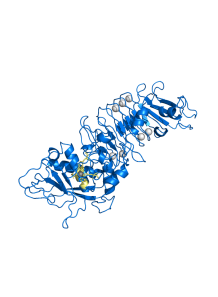Serrapeptase (Serralysin, Serratiopeptidase) (2400SPU/mg)
- Product Code: 125832
an enzyme derived from the bacteria Serratia marcescens. It is primarily known for its anti-inflammatory and proteolytic (protein-digesting) properties and is widely used in the pharmaceutical and health supplement industries
- -
- -
- -
- -
- -
- -
- -
- -
- -
- -
- -
- -
- -
- -
- -
- -
- -
- -
| Test Name | Specification |
|---|---|
| Appearance | Cream to brown powder |
| Activity of enzyme | Min 2400 SPU/mg |
| Loss on drying | 8% Max |
| Loss on ignition | 5% Max |
| Heavy metals as Pb | 5ppm Max |
| Heavy metals as As | 3ppm Max |
| Total plate count | 10,000CFU/g Max |
| TE | 30CFU/g Max |
| Yeast and Mould | 100CFU/g Max |
| E.Coli | Absent in 25g |
| Salmonella | Absent in 25g |
Serrapeptase, also known as Serratiopeptidase, is an enzyme derived from the bacteria Serratia marcescens. It is primarily known for its anti-inflammatory and proteolytic (protein-digesting) properties and is widely used in the pharmaceutical and health supplement industries. Its use in food is more specialized, and it is not commonly used as a food ingredient in general food production. However, serrapeptase may have some applications related to food or food processing, including:
1. Meat Tenderizing:
Serrapeptase, being a proteolytic enzyme, can help break down proteins, which might make it useful in tenderizing meat. Similar proteolytic enzymes, such as papain (from papaya) and bromelain (from pineapple), are commonly used in the food industry for this purpose.
2. Fermentation and Protein Hydrolysis:
In some cases, proteolytic enzymes like serrapeptase may be used in fermentation processes or protein hydrolysis to break down proteins into smaller peptides and amino acids. This can enhance the flavor, texture, or digestibility of certain food products.
3. Cheese Production:
In certain cheese production processes, proteolytic enzymes are added to break down proteins in the milk to improve the texture and flavor of the cheese. Serrapeptase could theoretically be used as part of these processes, though traditional enzymes like rennet are more common.
4. Clarification of Beer and Juice:
Similar to other proteolytic enzymes, serrapeptase could be applied in the clarification of beer, wine, or fruit juices. It helps remove protein-based particles that cause cloudiness in the final product, although enzymes like papain or pepsin are more typically used for this purpose.
5. Food Supplements:
While not used as a direct food ingredient, serrapeptase is often found in dietary supplements marketed for its anti-inflammatory, pain-relieving, and immune-modulating benefits. These supplements are taken orally, sometimes with meals, but not as a part of the food itself.
Be the first to review this product :-)
Recommend Lab-Service
| Lab Service | Price |
|---|
an enzyme derived from the bacteria Serratia marcescens. It is primarily known for its anti-inflammatory and proteolytic (protein-digesting) properties and is widely used in the pharmaceutical and health supplement industries
Serrapeptase, also known as Serratiopeptidase, is an enzyme derived from the bacteria Serratia marcescens. It is primarily known for its anti-inflammatory and proteolytic (protein-digesting) properties and is widely used in the pharmaceutical and health supplement industries. Its use in food is more specialized, and it is not commonly used as a food ingredient in general food production. However, serrapeptase may have some applications related to food or food processing, including:
1. Meat Tenderizing:
Serrapeptase, being a proteolytic enzyme, can help break down proteins, which might make it useful in tenderizing meat. Similar proteolytic enzymes, such as papain (from papaya) and bromelain (from pineapple), are commonly used in the food industry for this purpose.
2. Fermentation and Protein Hydrolysis:
In some cases, proteolytic enzymes like serrapeptase may be used in fermentation processes or protein hydrolysis to break down proteins into smaller peptides and amino acids. This can enhance the flavor, texture, or digestibility of certain food products.
3. Cheese Production:
In certain cheese production processes, proteolytic enzymes are added to break down proteins in the milk to improve the texture and flavor of the cheese. Serrapeptase could theoretically be used as part of these processes, though traditional enzymes like rennet are more common.
4. Clarification of Beer and Juice:
Similar to other proteolytic enzymes, serrapeptase could be applied in the clarification of beer, wine, or fruit juices. It helps remove protein-based particles that cause cloudiness in the final product, although enzymes like papain or pepsin are more typically used for this purpose.
5. Food Supplements:
While not used as a direct food ingredient, serrapeptase is often found in dietary supplements marketed for its anti-inflammatory, pain-relieving, and immune-modulating benefits. These supplements are taken orally, sometimes with meals, but not as a part of the food itself.
| Mechanism | - |
| Appearance | - |
| Longevity | - |
| Strength | - |
| Storage | - |
| Shelf Life | - |
| Allergen(s) | - |
| Dosage (Range) | - |
| Recommended Dosage | - |
| Dosage (Per Day) | - |
| Recommended Dosage (Per Day) | - |
| Mix Method | - |
| Heat Resistance | - |
| Stable in pH range | - |
| Solubility | - |
| Product Types | - |
| INCI | - |
Cart
No products



